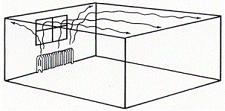What is a Handyman?
A handyman is someone who can perform a wide assortment of small tasks and odd jobs. Handymen offer low-cost services to their clients.
The tasks that a handyman can perform vary. Most are capable of undertaking small to medium-sized construction projects ranging from repairing damaged flooring to remodeling a room. Many can work in the garden, paint a house, and troubleshoot plumbing and electrical systems, even if they ultimately have to refer clients to a professional to fix a major problem.
A handyman can extremely useful because he can perform a wide range of repair tasks at one visit, allowing homeowners to call one person rather than several to deal with small problems that develop around the house. Many handymen also pride themselves on coming up with innovative, inexpensive solutions to problems to keep their costs down.
How Can a Handyman Help With Home Projects?
Most contractors either perform larger construction jobs (general contractors) or smaller, more specialized projects (tradesmen). This creates a problem for a homeowner who only has a need for smaller home repair or home improvement project. Homeowners can depend on the convenience of dealing with one person with their home improvement needs.
A professional handyman requires a reasonably high level of diverse experience and knowledge. Therefore, a handyman usually has a basic general knowledge about a more diverse list of construction skills than most tradesmen since tradesmen have a specific field of expertise (plumbing, electrical, painting, etc). Often, the services performed by a handyman are considered too small, or are not cost competitive for larger contractors and tradesmen to carry out.
How to Find a Good Handyman
It is usually easy to find a handyman; many advertise in phone books and with fliers around town, and it is also possible to track one down through word of mouth recommendations. Some people become quite attached to their handymen, since a good one can be hard to find.
The quality of repairs performed by a handyman can vary widely. Ask friends and neighbors for recommendations when seeking out a repairman, as they may have experience with several people in the market that allows them to recommend a particular individual. When you do find a handyman, you may want to ask about his qualifications, and if the handyman has a relationship with a licensed plumber, contractor, or electrician in the event that you require a tradesman to finish a job.
Finding a good Handyman is kin to finding a good mechanic. Many things can go wrong with your car, same as with your house. A good Handyman can fix plumbing and electrical, he can build small additions, demo walls, paint, tile, and caulk. Before you just grab the first one you see, there are some steps to make sure who you have is whom you want.
What Types of Handyman Services Are Out There?
Handyman Companies. There are professional handyman companies that will perform small home or commercial projects. Such companies can often claim the benefit of being properly insured and licensed (where applicable) and can provide scheduling and customer service functions for their staff of handypeople. Homeowners contract with different handymen because these companies employ handypeople either as full-time, direct employees, or as sub-contractors.
Professional Handyman. There are also handymen who operate their own business. They are responsible for determining the best methods to use, pricing the work, purchasing materials, perform the actual services, and collecting payments. Homeowners deal with only one person and issues are often easily handled to the homeowner’s satisfaction because customer is dealing directly with the owner.
What About Licensing?
Pennsylvania does not license or register general construction or home improvement contractors. There is no licensing requirement for handymen; the same is true for plumbers and electricians. Some handymen pursue licensure to make themselves more appealing to potential clients, and because it is easier to get bonding or insurance with a license.
Do You Need to Get a Handyman Who is Fully Insured?
Many homeowners appreciate the additional security of insurance protecting them from theft and damages caused by a handyman. If you decide that you want your handyman to be fully insured, ask for a copy of the handyman’s proof of insurance.
Do You Trust the Handyman?
- The choice is yours, after getting information about the job and how the job will be performed, trust your instincts.
- Do you feel comfortable with this person?
- Do you trust this person to be in your home and perform the job correctly?
- Do you foresee difficulties with communicating with this person after the job is complete should any issues arise?
Other Things to Consider About Your Handyman
- Level of professionalism
- Expertise
- Criminal history an/or Child abuse history; you cannot be too careful when it comes to safeguarding your home and family.
Before You Call:
- Walk through your home and list the small repairs needed. For example, dripping faucet, loose cabinet doors, faulty light switch, etc.
- Get organized before you make the call. Keep a list of all repairs needed near the phone so you can give the handyman a good idea of the job size before he comes to your home.
- Make a list of other items of concern or ones you think might get worse.
- Decide if you will be able to afford all the repairs at once or if you want them done in phases. If you want them in phases, prioritize what you want done first.
When Your Handyman Arrives:
- Walk through your home and describe each of the repairs to the handyman.
- Decide on an hourly, or per job rate. Realize that most firms front load the first hour.
- Ask for references and examples of other jobs if you still aren't sure about his work.









